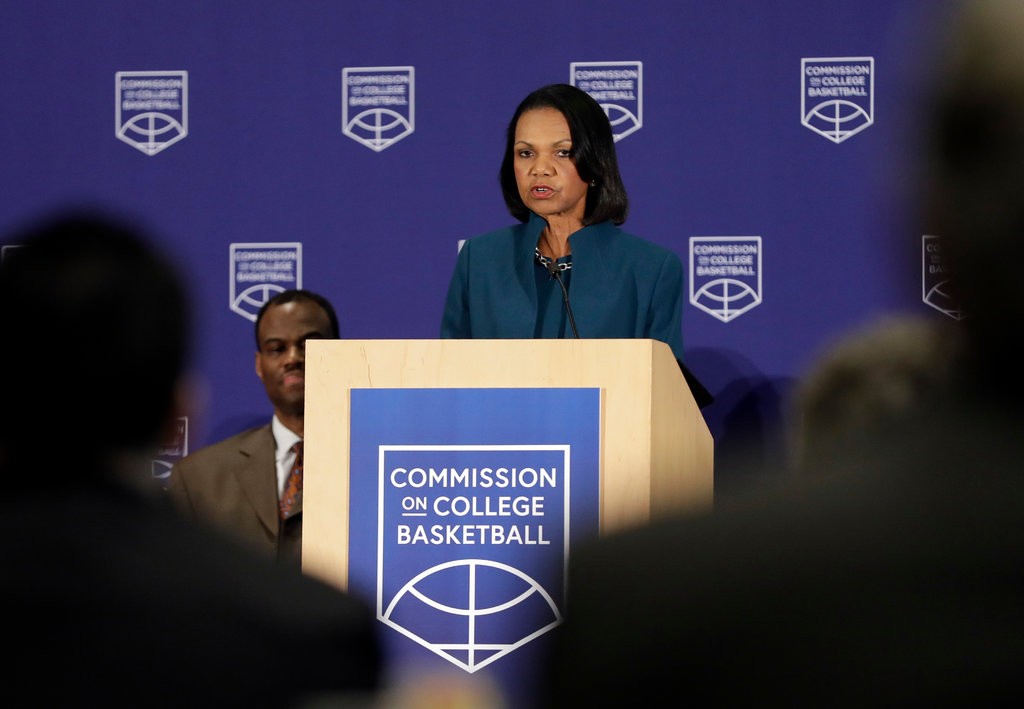
By Tom Liberman |
“A toxic mix of perverse incentives to cheat,” is the tagline from the report written by the Commission on College Basketball whose chairperson is former Secretary of State Condoleeza Rice. But is it really? Toxic! Perverse! Cheat! These are the words designed to make us take Rice and the report seriously. The horrors to be seen are so egregious that people should cover their children’s eyes, avert their own.
The reality is far different. The NCAA makes an enormous amount of money from college basketball. As do the universities. This money is made from television rights, ticket sales, luxury box revenue, gear sales, auctions of player equipment, and appearances of players among other things and distributed back to NCAA employees, coaches, assistant coaches, construction companies that build stadiums, well-paid sports announcers, and myriad others.
The NCAA has a series of ridiculous rules designed to prevent the student-athletes from taking any compensation other than an education. Then it creates a schedule by which the kids can barely get an education between all the games and practices. The NCAA backs these rules up with punishments that pale in comparison to the money to be made.
Toxic means poisonous. The rules aren’t toxic, they are just stupid. Why shouldn’t the student-athletes be just like every other student at the university who can make money? Why shouldn’t they be able to sell their likeness and signature to the highest bidder? The only reason we call them student-athletes is because the NCAA lost a court case in which they treated the athletes differently than regular students. It’s a legal dodge. Look it up, I dare you.
College administrators want people to attend games. Coaches want to win games. Announcers want the plum assignments that come with the top games to further their careers. Networks want exciting games for their audiences. They all should! More power to them. Just apply that same logic to the athletes and we’re done with this entire problem.
Fine, don’t pay the athletes directly other than perhaps a stipend like the Power Five conferences in NCAA football now do. Establish a 401(k) for each year the student attends. I don’t care. The main issue is the kids can’t make money off their own name. They aren’t allowed to seek legal advice from an agent to pursue their future. None of those things should be in the purview of the NCAA.
Perverse? Perverse!? What’s perverse is the kids aren’t allowed to sell their own autograph. It’s not a perverse incentive, it’s a perverse taking away of an incentive. It’s stealing the right to their own name!
Cheating is prevalent because of the rules, not despite them. It’s the rules that cause the cheating. If NCAA executives would simply admit the athletes have as much right to make money as the executives, this entire situation would be resolved.
Again, sure don’t allow direct payment while they are attending the university. I don’t agree with even this, but I understand the concept that college basketball is not supposed to be a professional sport league, newsflash, it is. Live in your dream world, NCAA. Make more rules about one and done, about apparel contracts, ban the best schools from post-season play and see what that does to your bottom line.
Another option is to accept reality. The tremendous amount of wealth generated by college basketball is going to cause people to want a piece of the action. That’s normal. That’s healthy. That’s capitalism in action. Let the players sign agents. Let the players get loans from agents on the assumption of future professional riches. Let the players sign autographs for money. Let them sell their likeness to video game makers. Let them attend college for however long they like before turning pro. Let them transfer from one school to the next should they so desire.
Give them freedom and then no one has to break rules.
Tom Liberman is a writer from St. Louis, Mo., who enjoys writing novels and spending time with his great family and wonderful friends.